Rhosymedre Circuit, Wales (mostly)
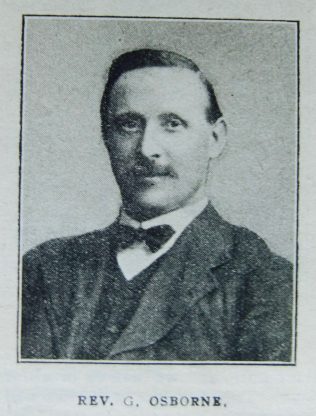
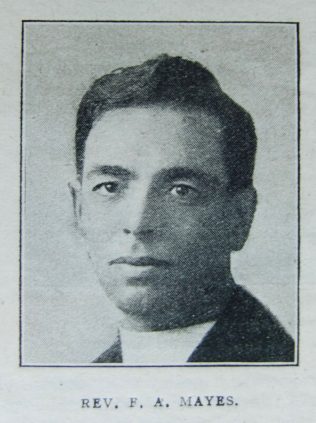
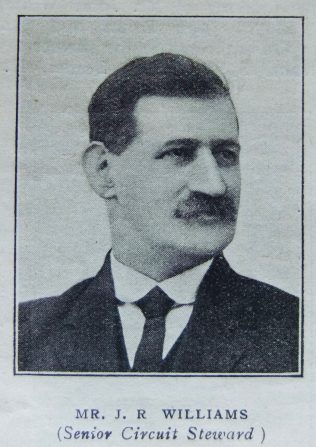
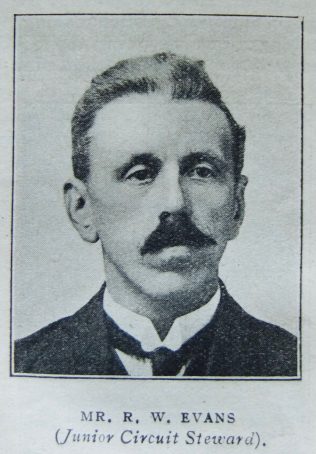
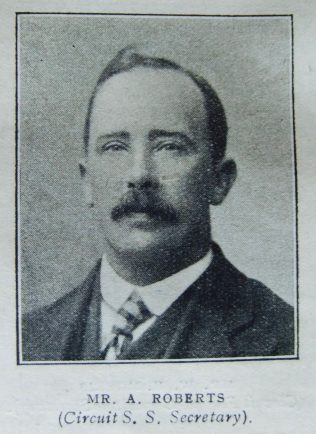

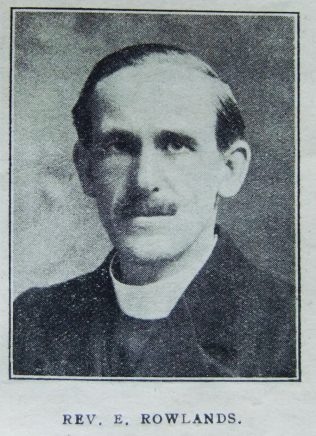
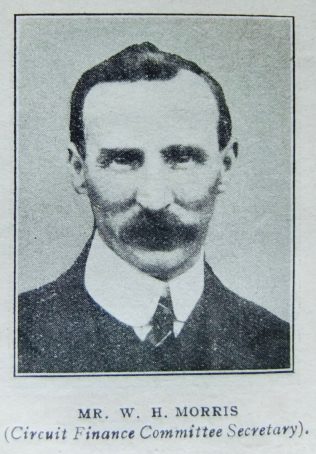
Transcription of Article in the Christian Messenger by Rev. George Osborne
As the name implies, Rhosymedre is largely a Welsh Circuit, comprising thirteen churches, ten of which are in the principality and the remainder lie across the border in Shropshire. A number of its members speak the language of Wales, and the temperament of the circuit is celtic. Such a district proved fertile ground for the distinctive message of the Primitive Methodist Church. The livelihood of the people was obtained by a variety of pursuits such as farming, coal-mining, brick making, and iron-smelting; but whatever their calling they received the Gospel proclaimed in their midst by Hugh Bourne, Doughty and others. Homes were opened, societies were formed, and ultimately churches built. Much of this work was done during the period of the Shropshire Mission of the Burland Circuit. Later, when the Oswestry Circuit was formed, the churches on the celtic fringe were incorporated with it.
Ever since its inception in 1876, the Rhosymedre Circuit has adopted progressive policies which continued success has amply justified. Today, by general consent, it is regarded as one of the strong country stations.
At Rhosymedre village we have a church with a membership of over 120, a large number of adherents, a Sunday-school of 240, and Senior and Junior C.E. Societies developing the life of the young people. The difficulty of securing a suitable site for a new church has been a serious handicap to this society, but while our workers await with patience the coming of the golden opportunity, they make the very best of the facilities they already possess, and success is the seal of their service. Among the many faithful who have passed to their rest, the names of Mary and Richard Williams (parents of Mr. John Williams), Robert Lloyd, John Evans and Samuel Cheshire are enshrined in the memory. To-day, Messrs. B. Butterton, Leader, R.T. Parry, Steward, supported by faithful colleagues worthily sustain tradition in their respective official positions. This ninety years old church satisfactorily maintains its position as the head of the circuit.
Cloy Society is one of the oldest in the circuit. The church was built in 1832. Situated in a scattered district, it has had an honoured career and thrives to-day. The devotion of the late Mrs. D. Capper remains among the most sacred treasures of the circuit’s life. Her faithful friend, Mrs. S. Stockton is also greatly esteemed. Their successors, Mr. and Mrs. W.H. Stockton and Mrs. and Miss M. Lea, carry on the work with devoted zeal.
In the beautiful village of Overton, we have a successful church witnessing for Christ and the principles of Free Churchmanship. Here the memory of the late Mr. James Morris, the village smith and saint, is a constant inspiration to a band of workers led by Mr. T.A. Thompson. Both Cloy and Overton Churches are situated in the “Hundred of Maleor.”
A church of great possibilities, and with a genius for attracting a large number of young people, sustains the witness of Primitive Methodism at Ruabon. The spirit of enterprise has abolished the debt, built up a commendable membership, and our officials are facing up to the work of holding our gains and considering a policy of extension. Here the late Mr. Joseph Langford, Local Preacher and Circuit Steward, spent many useful years, during which he served the circuit’s wider interests. With him toiled the late Mr. W. Richards, who established the Sunday-school. To-day, Mr. W.B. Jones, Steward, is supported by a number of devoted men and women.
St. Martins Moors is a church with a history recording brave things attempted and achieved. The first church was built here in 1829, though some years before this date Primitive Methodism flourished, and meetings were held in the open-air and various cottages. At one time this church was one of the strongest in the large Oswestry Circuit. Moors is not as strong today as formerly. Still it possesses the enterprising spirit. An institute has been erected recently to meet the needs of the young life. We have a vigorous Sunday-school, a good congregation and a fair membership. Stedfast supporters of our work here are Mr. John Conde, Miss Conde, Mr. Thomas Jones, and until recently, Mr. T. Morris, C.C., J.P.
We have a comely chapel and school and a long and honourable career to the credit of Primitive Methodism at Ifton Heath. Recently, disabilities due to death and removals have retarded our work in some measure. The passing of Mr. Stephen Leake (the great-heart of the circuit) and the removal of Mr. W. Evison, have been distinct losses, Yet brave workers remain, and we believe brighter days are ahead. This developing district will need more than ever the strong witness of Methodism. With this in view, Messrs. E. Roberts, J. Phillips, Stewards, and the loyal Leake and Stokes families “carry on” bravely.
Pontfaen is a small village nestling amid the beauties of the Glyn Valley. Here we have a well-managed church marked by a gallantry difficult to surpass, and a spirit which is the pride of the circuit, While the names of the late Messrs. Bridgewater, R. Jones and E. Roberts are treasured, our workers “act in the living present,” and a small village does not limit the vision of some splendid families led by Messrs. W. Tudor and P. Williams.
On a memorable day, August 4th, 1914, stones were laid for a new church at Vron. This church, which cost £1,500, was the realisation of the dreams of many, foremost among whom was the late Mr. Richard Jones, who gave £100 to stimulate the workers. Led by the Rev. S. Buckley, our people accepted the challenge. The small chapel on the hill was sold to the Denbigh County Education Authority for £500, a beautiful edifice was erected on the Holyhead Road, and called the Richard Jones Memorial Primitive Methodist Church. The constant enterprise manifested here is worthy of the highest praise, for, by the time this sketch appears, this church, equipped with almost every facility, will be free from debt. We are compelled to mention the names of Messrs. W.H. Jordan, J .P., Geo. Rowley, J.P., John Ellis, Job Evans, Jonah Evans, the late Thomas Davies (whose death was a sore loss), John Williams, and the faithful women workers, through whose untiring efforts this achievement has been made possible. We trust that freedom from debt will enable this church to serve the deeper needs of men.
Evergrowing lustre touches the work of our church at Black Park. A mighty past speaks to the men who lead the church in these, its palmiest days. Amid the many activities of this buoyant organisation, the distinctive thing is the glory which crowns the Mercy Seat. Its prosperous Sunday- school, superintended by Mr. E. Roberts; its inspiring week-evening service; its singing led by Mr. John Roberts; its Young People’s Guild: its Institute are all accounted for by the undimmed burning of the fire on the central altar of prayer. To these miners of Black Park, all projects are vain except the Lord conduct the plan. This church dares to be modern, because the voice of the past speaks “to the children of Israel that they go forward”; but abreast of all progress, and giving sanction to it, must burn the bright altar fires. There is real felicity enjoyed by this church, led by Messrs. S. Hughes, the venerable Henry Williams, and supported by a large number of officials and workers.
After worshipping for years in cottages, an iron church was built at Pontyblew in 1904, mainly through the efforts of the Rev. John Dudley and the late Mr. Stephen Leake. We have a fairly strong Society and a prosperous Sunday-school. Recently an Institute was erected. Mr. Edward Davies – a link with the past – is still with us. Miss Lily Edwards’ services in school and church are inestimable. The success enjoyed by this church testifies to the consecration of Mr. T. Northall, and the fine band of workers whose unity is the secret of their strength.
Rhos is a Nonconformist stronghold. Here we worship in a chapel purchased from the Baptists in 1861. We have a good Society and fine prospects. Our first need is a new edifice. A site has been procured, a new trust formed, and nearly £800 raised. Among a number of officials, the name of Mr. Kendrick Wynn is widest and best known. A man of sterling worth, honoured by his township, respected by circuit and district, loved by his church, he is a faithful Steward in all things pertaining to Primitive Methodism, and the Kingdom of God.
Copperas is a church of seventy members with vigorous organisations. Through the courtesy of Mr. and Mrs. Ferguson, parents of Mrs. Lavina Jones, meetings were first held in their home and a Society established. In 1891 a disused building was adapted for religious worship. It has served a splendid purpose, but our people are eager for extension, and their loyalty deserves the fulfilment of their hope. Some day, a worthier estimate should be given of the devotion and generosity of Mr. Edward Hughes, the Steward. He is loved by his church, children delight in his presence, while his counsel and comradeship in the circuit courts are an inspiration to officials and ministers.
The circuit’s youngest Society is at Chirk and was formed in 1911, during the ministry of Rev. S. Buckley. A school-chapel was built in 1912, on a site secured by the foresight of Messrs. S. Leake and W.H. Morris. Among others, Mr. C.W. Fawcett threw himself heartily into the work. To-day, Messrs. A. Rogers, W. Stokes, C. Morris and T. Griffiths lead a church vigorous in all departments. The forward movement has been amply justified. A golden opportunity lies before us at Chirk, asking only for consecrated effort to make our successes permanent.
The circuit possesses two excellent manses at Newbridge and Chirk.
FRUITS OF VICTORY.
That this group of churches has borne unfailing witness, the results clearly show. In 1912, the circuit called out a second minister. The membership is 655, conversions are not infrequent occurrences to-day, and the signs are propitious. The trust property cost over £11,000, the remaining debt on which is less than £1,000. There are 1,308 Sunday-school scholars with a teaching staff of 164, There are six Senior and five Junior C.E. Societies. A line Connexional spirit pervades the circuit. Evidence of this lies in its Missionary spirit. Since 1916, the circuit has sent £1,250 to the Missionary and Sustentation Funds. Mrs. J. N. Cookson of Copperas Church, is a great missionary enthusiast, who has collected £70 of the above amount. There are two branches of the Ladies Missionary Auxiliary, both zealous in missionary propaganda. To the African Jubilee Fund the circuit contributed £253. Messrs. J. R. Williams, R.W. Evans, Circuit Steward, H. Morris, Finance Secretary, A. Roberts and H.W. Hackett. Circuit Sunday-school Secretary and Treasurer, are live men, having the respect of the circuit in the prime of life. With such a backing the ministers hope for great things in the future.
References
Christian Messenger 1922/367





No Comments
Add a comment about this page